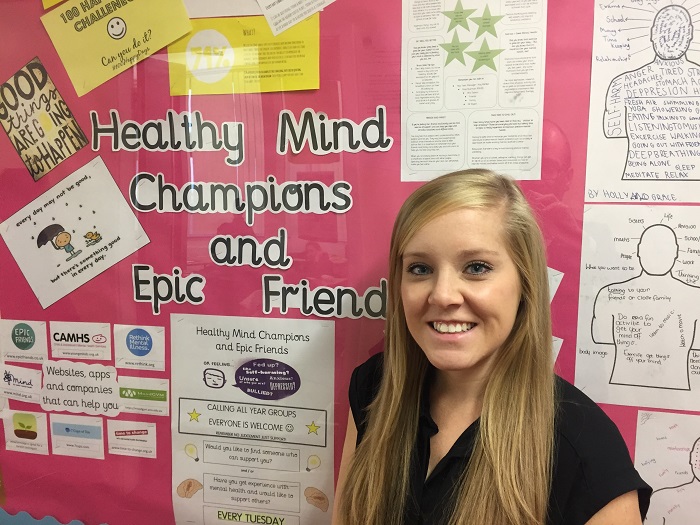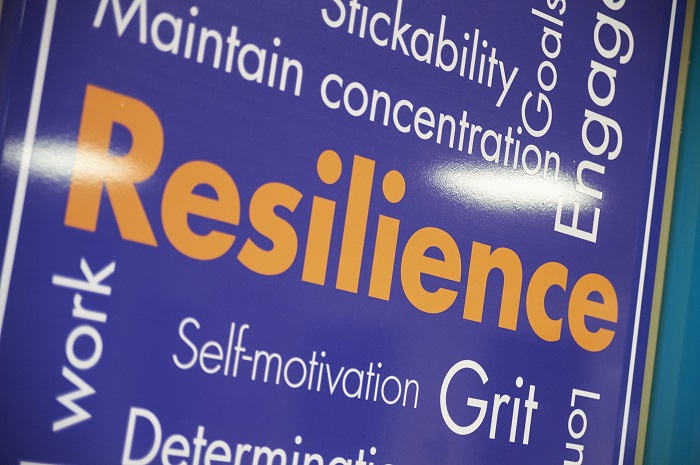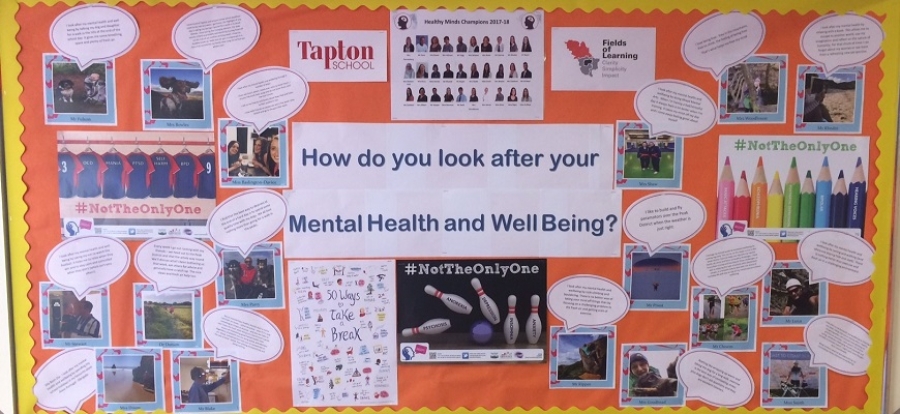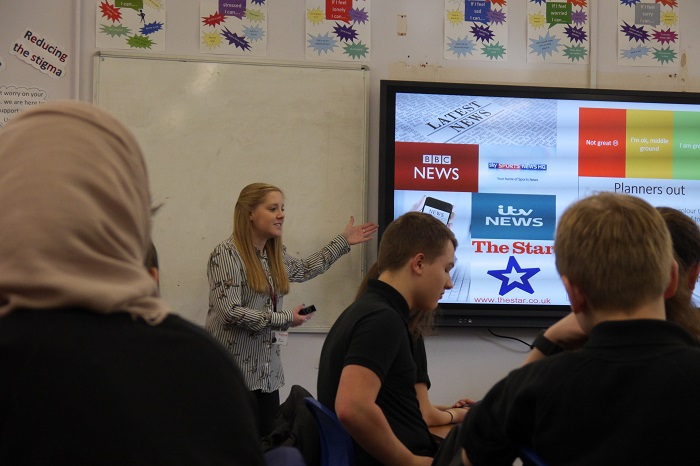“I’ve been teaching for 22 years and have seen the high turnover of staff and the stress that students experience every day,” explains Steve. “I feel like at Tapton, we have seen a cultural change for students, staff and parents - which means we are now building a resilient base for a more healthy and productive future.”
With this in mind, we decided that an interview with the Yorkshire school leader was in order.
Why is Tapton School so keen to be a leader in mental health support?
As a forward-thinking school, Tapton is always looking to provide students with the very best experiences and opportunities so that they are able to lead fulfilling lives.
Close analysis of our results showed a small-but-significant cohort of students who underachieved - compared to their predicted grades - because of known mental health issues at a key point before their exams. We were also aware of a number of students who were struggling to positively engage with school expectations and successfully access learning because of mental health and wellbeing issues. This has an impact on the smooth running of the school. Use of social media and family issues can have a huge impact on teenagers and their schooling. What’s more, the number of cases and their complexities appear to be increasing.
Children and young people’s mental health issues regularly grab the headlines. Especially concerning are the studies highlighting mental health as the biggest issue facing children and young people. With scarce resources and clear evidence that mental health issues are impacting on student performance, behaviour and lives, we know we have to play our part.
Staff mental health and wellbeing is also of key importance. This was brought into sharp focus recently following the government publication of ‘Thriving at Work: a review of mental health and employers’ [Oct 2017]. I fundamentally believe school staff can only deliver great pastoral care and lessons if they are in good mental health and their wellbeing is at the forefront of an organisation’s mind. Any support we offer students, we should look to offer staff as well.
Anything we can do as a school to live up to Tapton School’s ethos - ‘valuing everyone, caring for each other, achieving excellence’ - to do the very best possible for students and staff, is seen as a positive.
Teaching mental health at Tapton School
What are the greatest mental health challenges you face at Tapton?
The number one challenge, unsurprisingly, raised through student voice is exam pressure. Changes introduced to the exam system - making all courses at GCSE and A level linear so that all the exams are at the end of the course, with minimal controlled assessment, plus more and longer exams - puts students under even greater pressure in the build up to and during exam season. This makes teaching resilience and self-help techniques to promote positive mental health increasingly important.
Modern day life, family issues and social media pressures continue to test a number of students. Many are very aware of the negative impacts, but lack the confidence to seek help and support in a timely manner before the issues become more ingrained. We were also increasingly aware of the extra pressure staff are under due to increases in class sizes and workload as a result of budget constraints, as well as the pressures they face from modern day life. Helping students with their mental health and wellbeing requires staff buy-in. This can only happen in an environment where staff feel supported, where their emotional health and wellbeing is also given due care and attention.
The greatest challenge continuing to champion mental health and wellbeing for all. It’s vital to raising awareness and destigmatise mental health. This will help to ensure that students and staff seek and access support available when needed.

Tapton School associate assistant headteacher Hayley Sharman poses with a wellbeing board.
What advice would you give a school looking to modernise their mental health provision?
Mental health and wellbeing needs to be a whole-school approach; part of the culture, at the heart of everything you do. Fundamental is having a member of the leadership team who has responsibility for championing and leading mental health and wellbeing across the organisation, coordinating events, building a culture of support and developing staff skills.
It’s key for mental health and wellbeing to always to be on the agenda, at the forefront of people’s minds. Spend some time planning, so that events are spread throughout the year and dovetail with each other rather than having a big launch which then fizzles out. Gather student, staff and parent voice, and use this to inform your next steps. Students and parents at our school raised that they wanted greater signposting to the support available, which led us to take the bold decision to develop an extensive mental health and wellbeing section on the school website.
The website highlights the support available at Tapton, as well as signposting other support locally and nationally, and gives access to a wide range of information 24/7. Staff voice revealed many didn’t feel qualified in this area, and were hesitant to give mental health support for fear of giving the ‘wrong’ advice. Staff CPD helped to rectify this, and a large number of staff have since volunteered as mental health champions. I’d also recommend that schools work in collaboration and share ideas and resources with others - such as other schools, Child and Adolescent Mental Health Services (CAMHS), charities - to reduce workload and keep the momentum going.
What are your 2018 plans for pupil and staff mental health?
Early 2018 will see us again offer a parents information evening on ‘how to support your child with the pressures of exams’ in conjunction with CAMHS, so that parents are fully informed, giving them advice and strategies to support their children through exams. Much of this will also be shared with students and staff in school, in a bid to tackle our number one challenge as mentioned earlier.

A prominent sign at Tapton School
I am also looking to set up a parent-and-carers support group. Linking parents and carers up so that they see they are not alone, providing moral support for each other, and signposting other local services seems like a logical next step.
As a National Teaching School, Tapton School leads the Fields of Learning alliance. I see this as a fantastic opportunity to take the next steps to train staff in supporting student mental health and wellbeing. It is also important to provide training for all staff to help support their own mental health and wellbeing. This is a key area for me, as I believe it is important that staff look after their own mental health and wellbeing, supported by the school to be able to care for students. Staff mental health and wellbeing directly impacts on students and school.
Like many others, I eagerly await the outcome of the green paper on children and young people’s mental health. It will be interesting to see how it promotes mental health and wellbeing in schools, galvanises services and enhances support which we all recognise are much needed for children and young people. I am not a person who is inclined to sit and wait, and would urge school leaders to think what you can do to support child and staff mental health in their setting. This may be simply by talking about mental health in a form discussion, PSHEE lesson or assembly to raise awareness; setting up some support for students; organising staff training; or thinking about how you can support staff mental health and wellbeing. Success is not a big step in the future, but a small step taken right now.
Want to receive cutting-edge insights from leading educators each week? Sign up to our Community Update and be part of the action!



















